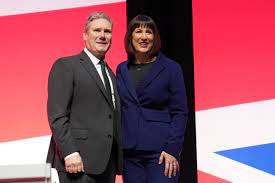What policies have UK’s Labour Party announced at their conference?

London: Britain’s opposition Labour Party has pledged to increase business investment, overhaul the country’s energy infrastructure and crack down on fraud, fleshing out its policy platform before a national election expected next year.
Labour has pledged to raise business investment as a share of economic output to 11%, up from 10%, and to create a national wealth fund to leverage private investment.
Labour said it would fast-track planning processes for priority growth areas such as battery factories and 5G infrastructure.
It also announced a plan to overhaul the National Grid and reduce delays companies face to connect to the energy network.
A Labour government would replace the so-called “non-dom” taxpayer status enjoyed by some wealthy individuals in Britain that means they can enjoy tax-free status on foreign earnings for up to 15 years.
This could raise more than 3.2 billion pounds ($3.90 billion) in tax each year, according to research published last year by the University of Warwick and the London School of Economics. FEE-PAYING SCHOOLS
Labour says it will start charging Value Added Tax on fee-paying schools, and full business rates on those in England.
Labour says it will crack down on ministers’ use of private jets, slash spending on the use of consultants, and will appoint a COVID corruption commissioner to recoup money that has been lost to waste, fraud and flawed contracts during the pandemic.
A spokesman for Labour’s finance policy chief Rachel Reeves said the plans would save the government 4 billion pounds.
Labour said it would set up a cross-departmental infrastructure acceleration unit. It comes after the government last week cancelled the northern leg of the costly HS2 high-speed rail project.
The unit would be responsible for ensuring crucial national infrastructure projects are delivered on time and on budget.
Labour said it would invest an extra 1.1 billion pounds to provide NHS staff overtime to work evening and weekend shifts to deliver an extra 2 million operations in its first year in order to reduce lengthy hospital waiting lists.
Labour said it would turn existing further education colleges for 16-18 year olds into Technical Excellence Colleges, which it said would align skills and training more closely with the needs of employers.
Labour said it would empower the water regulator Ofwat to ban the payment of bonuses to water bosses who are found to pump significant levels of raw sewage into rivers, lakes and seas.




